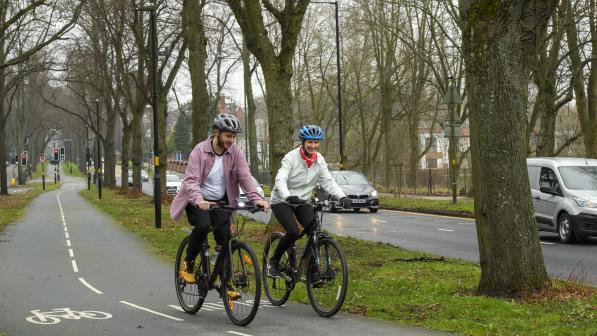More movement makes us richer, says new Create Streets report

- New report Move Free by think tank Create Streets outlines how giving people more choice on how they travel through places enabling walking and cycling benefits everyone, including those who need to drive
- More movement makes high streets more successful – retail sales increase by an average of 30% following projects improving pedestrian, cycling or public transport access to shops
- More movement makes us richer – beyond health and wellbeing benefits, more walkable neighbourhoods are worth between 10% and 55% more in land value
- More movement can make more homes – by creating more places in which it is easy to get around by bike, foot or public transport more homes can be created on less land
The easier we can make it for people to move around by giving them choice on how to travel, the more prosperous the UK’s towns, cities and places will be, according to a new report published today.
Move Free is an independent report, authored by design practice, town-builder and think tank Create Streets and supported by charity Cycling UK, outlines significant economic benefits among a range of others that the opportunity to walk or cycle brings.
One of the key points of the report is ‘more movement makes us richer’. Measured through land value, more walkable neighbourhoods are typically worth 10-55% more in controlled studies, making for more prosperous places and economies – neighbourhoods like this encourage more movement between places since it’s a more enjoyable experience.
This movement also makes high streets more successful. The report shows that flourishing town centres with the best commercial performance are ones that are safe and easy to reach, and not dependent on cars: retail sales increase by an average of 30% following projects that improve walking, cycling or public transport access to shops.
Nicholas Boys Smith, founding chair of Create Streets, said:
“Cars are great. Cars are awful. Cars can boost liberty. Cars can destroy it. Cars can help the economy. Cars can undermine it. It is largely a question of where. They add most value in areas of lowest density. They add least and do most harm in areas of higher density.
“When it comes to freeing up our streets, our advice to decision-makers is: add choice and let people decide with their hearts and heads; think about place not just about movement; and find gradualist ‘win-win’ processes for improving places with the consent, even with the active leadership, of local neighbourhoods.”
As well as the economic benefits, creating more places where it is easy to get around by bike, foot or public transport can also support the government in tackling the housing crisis, because almost twice as many homes can be built on the same amount of land.
Last year, 112,240 homes were built on land used for greenfield development. However by creating places where it is easier to get about by bike, on foot or by public transport, and not limiting transport choice to travelling by car, 220,471 homes could have been built instead. The same benefits apply when existing places are retrofitted to make them friendlier to people walking and cycling, creating more homes on less land.
Sarah Mitchell, Cycling UK’s chief executive, said:
“For some of us, and for some journeys, driving is necessary, but by providing other transport options and enabling other ways of getting around, driving also becomes easier for those who still need to drive, as the roads are freed up.
“We’re urging the government to strengthen national planning policy to ensure new developments don’t get planning permission unless sustainable transport options, including walking and cycling, are included.
“Whatever the outcome of the next general election, tackling the housing crisis will be a top priority for any government and it’s essential that all new homes are built with walking and cycling in mind. We must maximise transport choice so that people can decide what’s the best way for them to move around their local area.”
One of the greatest liberty losses of the past century has been children’s loss of liberty to move around their neighbourhoods. According to the study, there has been a 97% reduction from several miles to almost nothing at all. This has been bad for children and their parents – but creating more walkable neighbourhoods would give children some of this freedom back.
Notes to editors
- Cycling UK, the UK’s cycling charity, imagines a world where the streets are free of congestion and the air is clean to breathe, where parents encourage their children to cycle to school and everyone shares the exhilaration of being in the saddle. For more than 140 years, we’ve been making our streets safer, opening up new traffic free routes and inspiring more people to cycle more often.
- To read the full report, Move Free is available here.
- Move Free was supported by Cycling UK but authored by Create Streets with full authorial independence.
Press contact information
For more information, please contact the national Cycling UK press office. If you would like to speak to a member of the press office during working hours (0900-1700) please call Tiia Jaakola on 07867 175716 or email [email protected]. Out of hours, call 07584 271 300.
